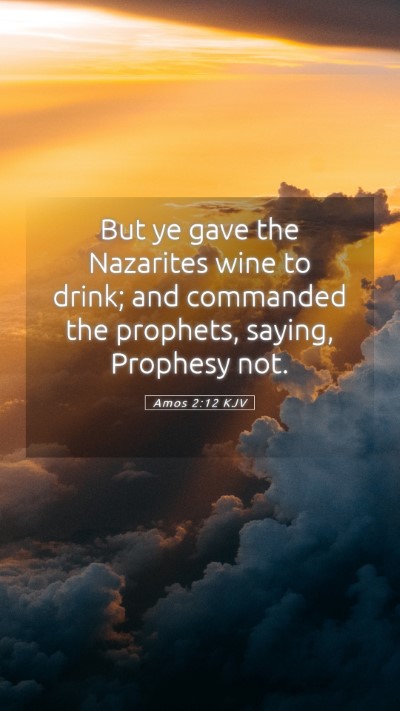Old Testament
Genesis Exodus Leviticus Numbers Deuteronomy Joshua Judges Ruth 1 Samuel 2 Samuel 1 Kings 2 Kings 1 Chronicles 2 Chronicles Ezra Nehemiah Esther Job Psalms Proverbs Ecclesiastes Song of Solomon Isaiah Jeremiah Lamentations Ezekiel Daniel Hosea Joel Amos Obadiah Jonah Micah Nahum Habakkuk Zephaniah Haggai Zechariah MalachiAmos 2:12 Meaning
What is the meaning of Amos 2:12?
But ye gave the Nazarites wine to drink; and commanded the prophets, saying, Prophesy not.
Amos 2:12 Bible Verse Meaning
Understanding Amos 2:12 - A Comprehensive Bible Verse Commentary
Amos 2:12 reads: "But ye gave the Nazarites wine to drink; and commanded the prophets, saying, Prophesy not." This verse is a significant aspect of the prophetic message from Amos, expressing the spiritual corruption and moral decline prevalent in Israel during that time.
Overview of Bible Verse Meaning
The meaning of this verse highlights two major themes: the corruption of the sacred and the rejection of God’s messengers. The Nazarites, who were consecrated to the service of God, were led astray by the people’s actions, illustrating a profound disrespect for divine commitments.
Insights from Public Domain Commentaries
-
Matthew Henry's Commentary:
Henry emphasizes the gravity of leading the Nazarites to drink wine, as it directly contradicts their vow of abstinence. This act symbolizes the people's defiance against God's instructions and their inclination to indulge in sinful behaviors, undermining the seriousness of their spiritual obligations.
-
Albert Barnes' Notes:
Barnes suggests that this verse illustrates the oppression of prophetic voices. The command to the prophets to cease prophesying indicates a systemic rejection of divine truth by the people who sought to stifle God's message. This rebellion against God's messengers reflects the spiritual blindness of the nation.
-
Adam Clarke's Commentary:
Clarke offers insight into the cultural implications of the Nazarite vow, explaining how wine was seen as a symbol of temptation and worldly pleasure. By tempting the Nazarites, the people displayed their willful disobedience. Clarke also highlights the significance of the prophets and the importance of listening to their warnings.
Biblical Context and Analysis
To fully grasp the significance of Amos 2:12, one must consider the historical context. Amos, a shepherd from Tekoa, prophesied during a time of prosperity in Israel, which paradoxically fostered a lifestyle of corruption and idolatry. His messages challenged the status quo, calling the nation to repentance.
Key Themes in Amos 2:12
-
Corruption of the Sacred:
The Nazarites were individuals dedicated to God, often associated with Samuel and Samson. Their commitment was compromised due to societal pressures, illustrating how society can lead individuals away from their divine purpose.
-
Rejection of Prophetic Voice:
This verse shows that the people not only dismissed the messages of the prophets but actively sought to silence them, which speaks volume to the spiritual state of Israel. When God's voice is rejected, the consequences are dire.
-
Moral and Spiritual Decline:
Amos's prophecy serves as a cautionary tale about the ease with which a society can slip into moral decay when it embraces sin and rejects divine guidance.
Application of Amos 2:12 in Daily Life
The implications of Amos 2:12 invite readers to reflect on their own spiritual commitments and the pressures they face in society. Here are some applications to consider:
- Examine areas in life where worldly influences may lead to a compromise of personal values.
- Encourage openness to prophetic voices within the church community, understanding that God's messages can come from unexpected sources.
- Commit to supporting those who are called to live sacrificial lives for God, much like the Nazarites.
Related Bible Cross References
- Numbers 6:3-4: Outlines the vow of the Nazarites and the importance of their separation from worldly practices.
- Jeremiah 20:8-9: Reflects the challenges faced by prophets when their messages are rejected.
- Matthew 23:37: Jesus laments over Jerusalem, indicating the historical tendency of people to reject God's messengers.
Conclusion
In conclusion, Amos 2:12 serves as a profound reminder of the consequences of turning away from God and the importance of honoring sacred commitments. The study of this verse reveals deeper insights into human behavior and the relationship between society and divine authority. By engaging with scripture analysis and biblical exegesis, believers are encouraged to deepen their understanding of God's word and apply its truths to their lives.
For readers involved in Bible study groups or seeking online Bible study, this verse exemplifies the need for Bible study insights that challenge and encourage spiritual growth.


